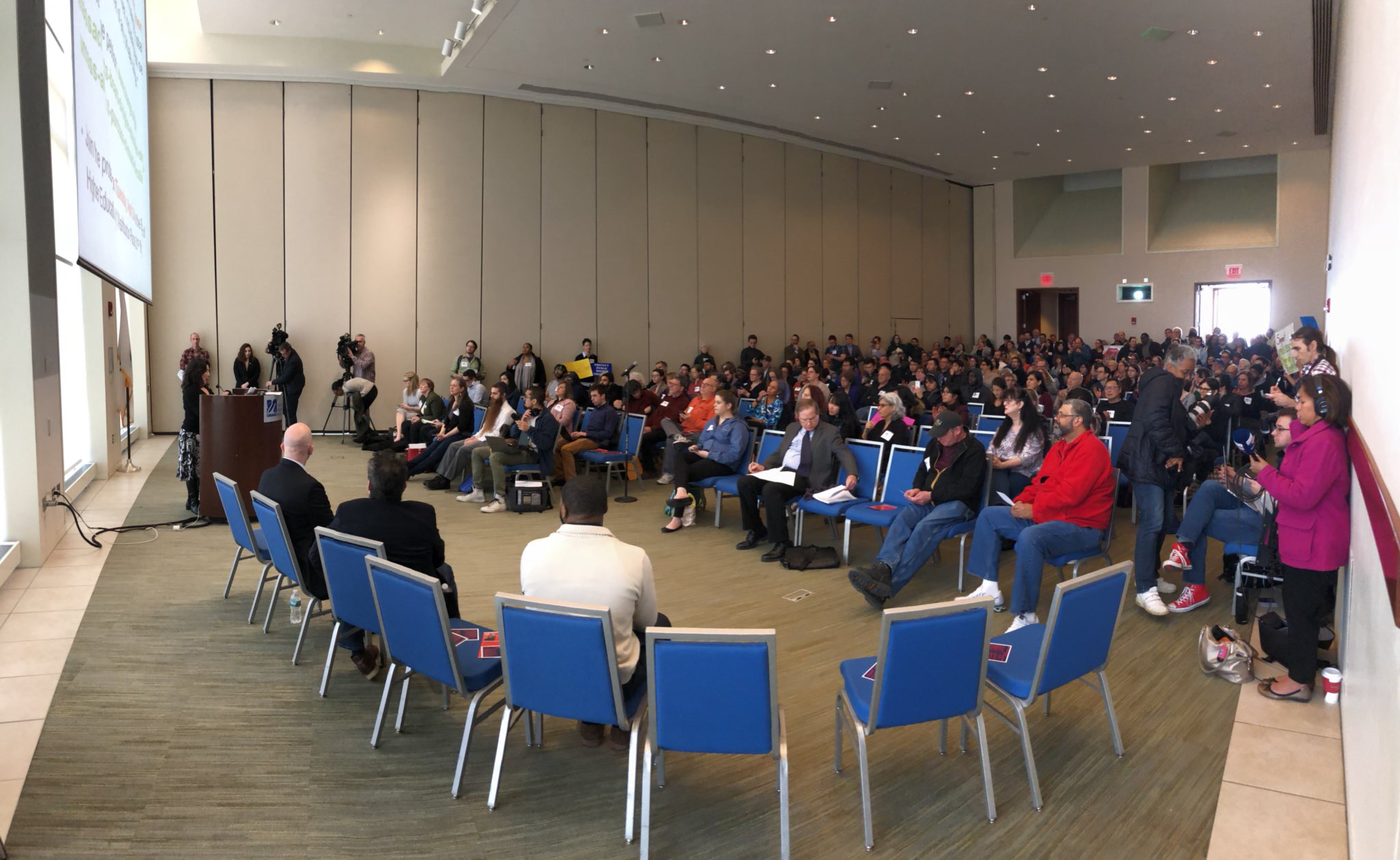Delivered by Aaron Lecklider, Department Chair of American Studies, at the Save UMass Boston Community Meeting on April 18, 2018.
Photo: The Save UMass Boston Community Meeting on April 18th. (Zac Bears/PHENOM)
“But what about the future?! Oh God, give us our future!” – Clarice Lispector
In the brief time I have here today, I want to talk about the future.
I’m concerned about the issues UMass Boston is facing today. I am concerned about the acquisition of a campus for UMass Amherst students that ignores the impact on UMass Boston, made behind closed doors without even a gesture towards bringing our campus into the conversation.
But I am also concerned about how this decision leaves us unable to plan for our future.
Many of us in this room grew up poor, or working poor, or working class. Many of you still find yourselves struggling to make ends meet.
Here is something I have learned from my past.
When you are poor, your life is structured by debt, and debt means your future is always a form of punishment for your past.
When you pay your credit card bill, you pay unsupportable interest on your past purchases. If you dare to think about a future without debt, you might imagine what it would feel like to not be burdened by that past. But every day, debt weighs on you, affecting your thoughts, your ability to sleep, to focus. It is impossible to think about the future because it is impossible to get out from under the thumb of the past.
When you go to the gas station, you don’t fill the tank, ready for any trip that you can imagine. You scrounge for cash, and put in as much gas as you can afford with what you have on hand. You plan your trips based on what’s in the tank, crossing your fingers you will make it home.
When you’re poor, you don’t think about home renovations. You think about home repairs. You move into a home that you can afford – one that might, to give an arbitrary example, have a crumbling foundation that is desperately in need of repair, or elevators that don’t work, or facilities that leak and staircases that have to be closed rather than repaired – and you spend your time worrying about your home, and thinking about what you might pawn or sacrifice to maintain the structure that houses you. Your neighbors might be thinking about an expansion, or installing a pool (even as yours is being closed down), but you are worrying about the repairs you can’t really afford, no matter how many hours a week you work. You want to think about the future, but the future never seems to come.
I’ve been thinking about these things because I’m struck by how the news of Mt. Ida seems to once again isolate UMass Boston, a university struggling with unsustainable debt, as an institution with no future. We are a campus that serves the public. We are a campus that gives opportunity to the poor, the working class. We are a campus that understands intimately the links between race and class, the persistence and legacies of racism, and we understand this not because it’s something that is taught in our classes – though it is, and it should be – but because our community, our majority-minority students, bring these experiences into the classroom. We are a campus that is rich in opportunity and experience but poor in resources.
We are a campus burdened by debt, and servicing that debt has become our identity. It has prevented us from looking to the future, even as our sole purpose in the Commonwealth is to help students build a future for themselves.
The Mt. Ida deal has stung precisely because it seems to be a decision that ignores our future while allowing UMass Amherst to invest in theirs. It allows a campus to take on the debt of another college even as we are unable to service our own. We need new classrooms. We need space to move programs such as nursing that are housed in the Science building and will soon be homeless. We need affordable parking. We need a future, but we cannot think about the future when we are consumed by the pressures of debt that leave us gasping for air.
The state legislature, the system, the Governor, have repeatedly failed to fund us in a way that would put us on sound financial footing. They have abandoned us to manage our debt and make repairs to our campus that we cannot afford. We are told we must show fiscal restraint, we must prove that we have sufficiently suffered for the sins of our past by cutting deeper and deeper into our university’s mission. As anyone on campus knows, debt has become our campus priority. Debt is our brand.
The Mt. Ida deal stings because it demonstrates so clearly that our future is not a priority for the system or for the Commonwealth. As long as we are burdened by the servicing of our debt, the world can move in around us; the UMass system can celebrate the expansion of the Amherst campus into our own back yard. Amherst has a tank full of gas, and they are hitting the open road. We are hoping to make it to the end of the fiscal year before we stall out on the side of the highway.
When we talk about equality across campus, we are not speaking only about distribution of resources, though those matter. We are speaking also about the need for our campus to be able to participate in conversations about the future – our future; the UMass system’s future; the future of higher education in the Commonwealth. Our students are worth the investment. As a majority-minority campus, we are the future of the United States. We are future leaders, and politicians, and artists, and doctors, and computer programmers, and social workers, and activists. And if we are to fulfill our mission on the UMass Boston campus, we need to be allowed to plan for that future with the resources that are necessary to get there.
What the past two weeks have shown me is that we aren’t out of gas yet. I have seen students, faculty, and Deans coming together to sound the alarm, and to demand more forcefully than I’ve ever seen that UMass Boston does have a future, and we are not going to allow that future to be neglected. As we move forward, I want to encourage all of us to continue demanding that we be a campus that has a future and that can talk about and think about the future. We must continue to push for fully funding our campus. We must demand that the legislature pay fully – not partially, fully – for the repairs to our substructure. But perhaps of equal importance, we must continue to fight for our future to be put at the center of conversations about our campus, and that decisions made by the university system be made with us at the table. We should not be learning about major decisions affecting our campus in the newspaper after a deal has been struck; we should be in the room when those decisions are being considered.
We can have a future here at UMass Boston. We deserve it, and we will not be content to be told otherwise. The future of Boston is here on our campus, and here in this room. We demand our future, we deserve our future, it’s time for leaders to step up to the plate and give us our future. And that is something that must happen today.

